Mikhail Botvinnik - The Positional Bulldozer
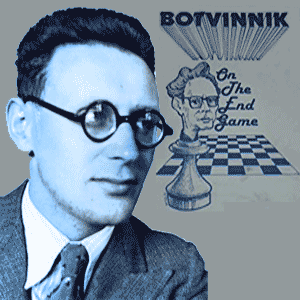
Mikhail Botvinnik
Botvinnik was the first major player to come out of the newly formed Soviet Union towards the end of the 1920s. He headed a long line of incredible talent and he played a major role in building a conveyor belt of top class Soviet players.
From 1927 right through to 2000, Russia/USSR would dominate the chess world with only brief interruptions. Botvinnik's legacy is his role in the organization of Soviet chess. He played his part in his country's stranglehold, lifting the World Championship in 1948 ahead of former champion Max Euwe and others.
Young Mikhail
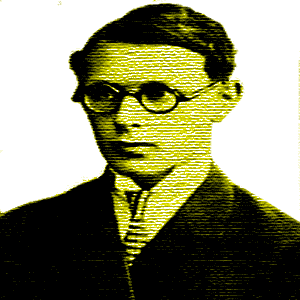
A young Mikhail Botvinnik
He fell in love with the game and quickly became most formidable, winning school tournaments. The World Champion Capablanca came to Leningrad to play an exhibition simul. Botvinnik, barely 13, got a place on one of the boards and won his game with the mighty Cuban. He had been playing chess for only a year.
After that he was a regular on the Leningrad team. At the age of 16 he became the youngest player ever to make the final stage of the USSR Championship, becoming a National Master in the process. He won the Leningrad Masters in 1930 and finally in 1931 captured the USSR Championship at the age of 20.
Competing in the USSR
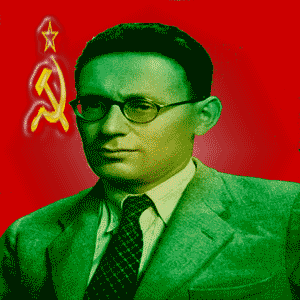
Mikhail Botvinnik dominated Soviet chess in the 1930s
As the decade wore on he added to his tally of championships and major city titles around the Soviet Union. The work of the USSR chess officials began to take shape and many strong Soviet players were beginning to emerge.
Botvinnik now had designs on Alekhine's World title but he was not alone. Max Euwe and Salo Flohr were also eyeing up the big prize. Botvinnik would have to play matches against high caliber international opponents to strengthen his claim for a title shot. He also began to play tournaments outside the Soviet Union.
Botvinnik vs Flohr

Salo Flohr with Mikhail Botvinnik
Hastings, England 34/35 was the scene for his first competition in the West. He was now 24 years old and reaching a high level of performance. He arrived in Hastings just hours before the tournament started.
He finished a disappointing joint 5th. Emanuel Lasker, by now a wise old man of 67, suggested that the late arrival was the cause for the poor result. Lasker said that he would have been better coming 10 days before the start of the competition to acclimatize.
Botvinnik learned this lesson well and did not repeat it. He was on the international circuit now and his results soon improved. Joint 1st at Moscow 1935 with Flohr, 2nd behind Capablanca at Moscow 1936, joint 1st with Capablanca in Nottingham and 3rd behind Keres and Fine at the AVRO in Holland.
World Championship Candidate
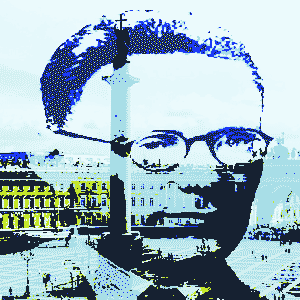
Mikhail Botvinnik challenged Alexander Alekhine
By 1938 Botvinnik, Euwe, Flohr, Fine and Keres were trying to get a title decider with Alekhine. Capablanca had not yet given up either. Even though he was now barely on speaking terms with Alekhine, he was also still trying to secure another chance to win back the World Championship.
Alekhine had been castigated by the Soviet authorities. Botvinnik believed that he was eager to get back in favor with the USSR leaders. He also believed that Alekhine was prepared to deal with whoever could raise the highest stakes for the match.
Chasing Alekhine

Botvinnik tried in vain to organize a match against Alekhine
The World Championship Match was set to go ahead but the outbreak of World War II put the whole thing on hold indefinitely. The war would last for six years and international chess went into hibernation in Europe during this period.
Botvinnik played a handful of tournaments inside the USSR during the war years. After the war he again attempted to organize a match against Alekhine. The match was organized for 1946 in England as Alekhine's alleged Nazi links meant he wasn't welcome in the USSR. Alekhine died shortly before the match could take place. The World Championship would have to be decided between the world's top five players on a league basis.
In the meantime Botvinnik was 1st at the 1941 Absolute Championship of the USSR, 1st at Sverdlovsk 1943, 1st at the 1944 USSR Championship and 1st at the 1945 USSR Championship.
Title League
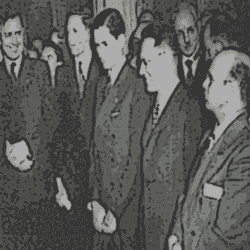
1948 World Championship League - Left to Right: Euwe, Smyslov, Keres, Botvinnik, Reshevsky
At the end of it all, Botvinnik finished in top spot (14/20), followed by Smyslov (11/20), then Keres and Reshevsky both (10.5/20) and finally the ex-Champion Euwe (4/20).
There were suggestions that Soviet officials leaned on Keres somewhat. Some would say that he may have been advised that Botvinnik should not be blocked in his attempt to be World Champion.
Apparently Botvinnik himself heard of such conversations and objected vigorously. Paul Keres lost four of his five games against Botvinnik. How much influence the advice had is impossible to say.
Tenure as Champion

Bronstein, Smyslov and Tal
Vasily Smyslov came just as close in 1954 with Botvinnik again escaping with a draw. Three years later in another World Championship match, Smyslov won, taking the crown. But just a year later Botvinnik reversed the result winning back his title.
Mikhail Tal from Riga was next to challenge in 1960. He won convincingly over Botvinnik with his tactical puzzles throwing a spanner into Botvinnik's positional works.
But Botvinnik again activated his rematch clause and trained hard for it. Tal wasn't in the best of health and this may have affected his performance in the rematch. Either ways Botvinnik prevailed with daylight to spare winning back the World Championship once again.
Botvinnik vs Petrosian
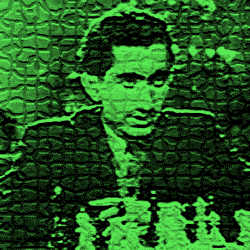
Mikhail Botvinnik lost his title for the final time against Tigran Petrosian
Petrosian was the kind of guy who didn't score the full point against top class players as often as many chess enthusiasts might have liked. But his lack of adventure meant that he rarely lost.
Going into the match Botvinnik knew that any mistake would be severely punished. Petrosian would play really solid and wait for any error to pounce on.
Botvinnik's class brought him a couple of wins but overall he had to take the initiative and force the issue in the games. He took more of the risks and eventually Petrosian won 5-2 (15 draws).
Later Years
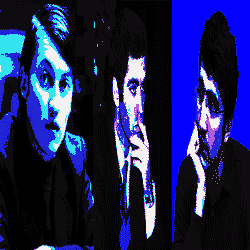
Karpov, Kasparov and Kramnik
He continued to compete in major tournaments up until 1970 showing his old magic in flashes now and again. He was no longer able to win the biggest tournaments but he could still win a game against anyone.
He founded a chess school in 1963 and many great players from what was the USSR graduated from it. Anatoly Karpov, Garry Kasparov and Vladimir Kramnik eventually became World Champions.
Other high level players included Alexei Shirov, Vladimir Akopian and Jaan Ehlvest. Mikhail Botvinnik continued to work until shortly before his death in May 1995.
Legacy of Botvinnik
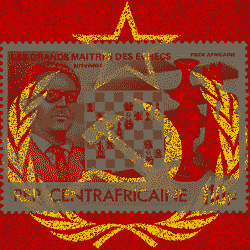
Mikhail Botvinnik was the main driving force in Soviet chess for decades
He dominated Soviet and World chess for many years. He was instrumental in the development of the World Championship providing much input into how it should be contested. His opinion on how Soviet chess should be structured in order to bring fresh talent through also held a lot of weight.
As a result his fingerprints were all over the successful chess organization in the USSR that produced the players that would dominate World chess from the 30s right through to the 90s.
Several of the former Soviet republics like Russia, Ukraine, Armenia, Georgia, Azerbaijan and others are still among the top chess nations today. Mikhail Botvinnik certainly played his part in that.
Moving On
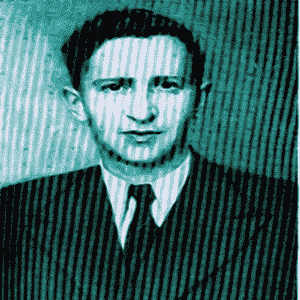
Vasily Smyslov
He did not use a wide variety of openings, but knew the ones he did intimately. The Queen's Gambit Declined, the Caro-Kann Defense, the French Defense and the English Opening were his trademark openings and he added to the theory of these.
It was his own success that overtook him in the end. All of the players coming in the years after him came from the Soviet system that he helped to build. Maybe he took some satisfaction from that. The first of these was Vasily Smyslov.






